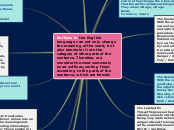Suffixes in the English language can not only change the meaning of the word, but also translate it into the category of other parts of the sentence. Therefore, we consider the most commonly used suffixes, sorting them according to the parts of the sentence, which are formed.
The Cal Suffix
Convert nouns. In adjectives. Nouns ending in c only add to. It means ico, ica
Alphabet / alphabetical = alphabet / alphabetic (ica)
Medic / meical = doctor / doctor
The Ess and Ine Suffixes
The suffixes ess and ine allow to change the gender (male / female). Both make a masculine noun feminine:
Poet / poetess = poet / poetess
Emperor / empress = emperor / empress
bring Pictures and Videos to help you
make info
easier to remember
interesting
save time
use colours to highlight what's important
yellow = facts, examples
green = dates, names, places, and formulas
red = super important
use Emojis to point out
figures
quotes
concepts
definitions
The Ly Suffix
This suffix allows to transform a qualifying adjective or a noun into an adverb, adding the meaning mind. The adjectives ending in him simply change the e by y; Those ending in l and converting the y into i and adding l; To the terminated ones in which they change the e and ly; To those finished in ll add only and; Those ending in ue change the e and ly.
Bad / badly
Open / openly
Water / watery = water / watery
Angry / angry
The Able Suffix
Suffix that forms adjectives from verbs. It does not apply to nouns. It means able, ible:
To drink / drinkable
To reason
The Tion Suffix
The suffix tion which means cion, or, allows to transform verbs into nouns, according to the following guide:
Verbs ending in the consonant t, simply add ion; The finished verbs ate, ute, eliminate the e and add ion; The verbs ending in the vowel and that do not form of ate / ute, change the e by a and are added tion.
To educate / educate
To pollute / contaminate
The Suffix Ful
The suffix Ful is added to nouns to form nouns and adjectives. Mean, gone, gone, bear:
Wonder
Color / colorful = color / colorful
The Suffix Y
The suffix y is used in English for 3 purposes: It is added to nouns to convert into adjectives and express similarity or to indicate abundance. And in case a noun ends in e converts the simply e into y. It means ado, bear and rarely means able; Used to obtain the diminutive, for the effect if it ends in consonant this is repeated. Means ito, ita.
The Ment Suffix
We use the suffix ment in English to turn some verbs into nouns. Making in the Spanish language the extension oration, ment
To move
To enlarge / enlarge = enlarge
mark topics that still need your focus
"Repetition is the mother of learning"
go over the map
put your mind to work
recall as many details as you can about the keywords you added
The Less Suffix
This suffix gives us the possibility of altering nouns to obtain adjectives. Being very useful when dealing with comparatives. It is a negation type suffix and which means sin.
Worth / worthless
Hoe / hopeless
The Ness Suffix
With the ness suffix we convert qualifying adjectives into nouns. But if the adjective ends in and is changed this by the i before the suffix is added. Meaning, eza
Sick / sickness = sick / sick
Dark / darkness = dark / darkness
put it in your own words, along with images and videos
you won't forget it
you become smarter with every new thing you learn
gather vital information from
what your colleagues share with you
what you are reading extra
internet
books
teacher's lecture
The Ous Suffix
With the suffix ous, which means oso, osa we transform a noun in adjective and according to the following procedure:
Nouns ending in r simply add ous; The finished ones in and they change and by ous; The finished in and changes it by i and add ous, to the finished noun in or add us, those ending in on removes the n and is replaced by us.
Danger / dangerous
Fury / furious = fury / furious
The Suffix Ance
The suffix ance is used in English to convert verbs into nouns. If the verbs end in e they change the e by a so that the suffix remains unchanged. They mean old age, old age.
Guide
To insure / insure
easy to
delete info
add new info
find what you need
stick all the info you need in a map
bookmarks
documents
videos
links
The Suffix Ship
By adding the suffix ship to an adjective we obtain a noun and derive nouns derived from nouns and verbs. It is used in a very varied way to denote: abstract qualities, art or dexterity, dignity, office, title, title, duration of action, and usually signified.
Citizen / citizenship = citizen / citizenship
Dictator / dictatorship

